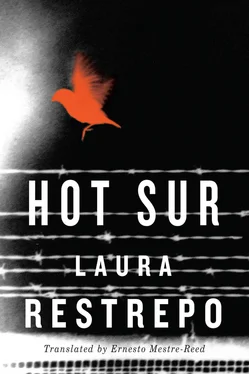Rose didn’t dare go back to the East Village for the night. He had to remain nearby, just in case. So he stayed in a hotel not far from the hospital. He didn’t sleep a wink, hour after hour tossing and turning, disturbed by all kinds of dark musings. What if the police were tipped off and they rounded everybody up, including him? What if María Paz died on the operating table, which was actually nothing more than a kitchen table, probably? What would they do in such a case with the body? What guarantees could they offer in that hole, what insurance or permits? Rose couldn’t understand how he had come to accept all this, how he had allowed them to stoop so low, and the worst was going to come if something happened to her. He and the tango singer would be jointly responsible for her death, and he already saw himself sharing the death row with the Uruguayan impostor and Sleepy Joe.
Early the next morning, he dressed without showering and showed up at the place determined to get her out of there, his alleged daughter, or wife, or daughter-in-law, whatever she was, though he didn’t really have any way to prove his relationship to her or to assert any authority over her.
“You can go in and see her. The operation went well. She’s stable and already in recovery,” one of the comadres from the previous day told him. Rose followed her down a narrow corridor, still full of misgivings, bringing María Paz a macchiato and cookies from Starbucks.
After going through the back door, the offices, desks, and gray carpet vanished. The dividing walls also vanished, and suddenly Rose found himself in a wide-open space — clean, white, and well lit, with a row of hospital beds behind screens. An entire secret hospital in the heart of New York. Good God, thought Rose. Who would believe the country had grown into a gigantic strudel cake with layers hidden upon layers beneath the surface? All you had to do was dig a little bit to discover the most unexpected realities. How had it come to this? American society, solid and unquestionable until yesterday, was now an empty bread crust eaten by weevils. Rose approached María Paz, who was resting in one of the beds, still wearing the disposable green robe and a bit pale, but smiling.
“Look at it, Mr. Rose! Here it is!” she said, making a noise with the jar that held the little clamp they had just extracted and displaying it proudly, like a child showing off some strange bug.
Rose tells me that he took María Paz to the mountains to recover from the operation, and that when they got there, Empera greeted her with a hug, and the dogs leaped all around her as if she were an old friend; of course they did, since they knew her so well from before. “That’s life,” Rose tells me. “All that time I was looking for her, and she had already found me. I was searching for her all over the place, unaware that she had been in my own home. As soon as we entered, she wanted to look around the ground floor and wanted me to start a fire. She said that during the week she had been hiding in the attic she could tell when I lit a fire by the smell of pine burning. Then I walked with her, taking little baby convalescent steps, to the place where Cleve had buried the ashes of her dog Hero, and I confessed that they had been dug up but quickly agreed that we should bury them again in the same place, and we did. So that she did not have to walk up and down the stairs, I suggested that she stay in my room, and I’d move to Cleve’s room, but she said no. She preferred to stay upstairs, because there were so many treasured memories.”
Together, they spent some time without mishaps, Rose taking care of her and María Paz allowing him to do so, alone in the house with the dogs, because Empera had gone on her annual pilgrimage to Santo Domingo to spend the holidays with family, trusting she could return to the United States in late January, probably violating for the umpteenth time in her life the rigid border controls against undocumented immigrants. On top of that, there was a heavy snowfall in the region that almost completely isolated them; no one could come into or leave that area of the Catskills without running the risk of encountering some dangerous road conditions. In that sense, María Paz felt safe and could relax; it helped her to calm down and recover. For Christmas she wanted to make a Colombian ajiaco and was pleased to find out that Rose had already tried the dish during his family’s stay in her country, and he had liked it enough to dare to brave the elements and go get the ingredients, insofar as it was possible, because the local corn was too sweet, and forget about finding the three kinds of Andean potatoes, which had to be replaced by Chieftain, Dakota Rose, and pale Idaho potatoes. There was also no way to get the herb called guascas, so they used marijuana leaves instead as she had when she made the ajiaco for Greg, which they plucked from the emaciated and yellow plants Cleve had grown in the garage and that since his death nobody had cared for.
“For some reason, making that soup was very important to her,” Rose tells me. “It wasn’t like the original in Bogota, only remotely similar, but it didn’t matter to María Paz. She was really happy when we set up the Christmas Eve table.”
They were very easygoing days for the most part, Rose tells me, even enjoyable, because the girl was really smart and charming, and they had a common topic that brought them together, Cleve. The admiration and affection with which María Paz spoke about Cleve brought Rose to tears. But there was another topic that set them against each other, with each standing at opposite ends and neither of them ever completely lowering his or her guard, generating between them a kind of double-sided game, never fully resolved, and leading them to constantly oscillate between familiarity and mistrust. That other topic was Sleepy Joe. Any hint about his criminal nature turned the tide against Rose. María Paz was closed to such discussions, defending her brother-in-law with an irrational stubbornness that he couldn’t understand. He tried to make her see that Sleepy Joe was responsible for Cleve’s death, but he had no hard evidence, and she refused to accept even the possibility. At the most, she called him the bastard brother-in-law, or a bully and thug, euphemisms that hurt and wounded Rose, because they suggested a solidarity that was intact between María Paz and Sleepy Joe, and this was too much like a betrayal.
Rose realized she contacted other people with a lot of whispering and mystery, in the rare and brief calls she made from one of those prepaid cell phones. Rose was watching, it could be said spying, and through those calls he learned that although she had postponed her trip in no way was it canceled, and she remained in contact with the cyber-coyote who would help her escape the country through the Canadian border. Rose didn’t ask her too much; he let her be, but occasionally she let some of the specifics seep out, and they sounded to him like details of a delusional and crazy plan, crossing the forests of Indian territory in the middle of winter, traveling by boat on the lakes, with the native people of the area guiding them and providing them with food and accommodation. Regardless, Rose remained vigilant, hoping that sooner or later she would lead him to Sleepy Joe. He was sure the guy was following them systematically. He could sense his closeness and imagine his stalking.
“During all this, Pro Bono came back from Paris,” Rose informs me, “and he started calling me to see if I had news about María Paz. I dismissed his inquiries, making believe I was disgusted by his desertion. I told him I didn’t know anything about María Paz and didn’t want to know anything about her. You see, I had my own plans in mind. I was following my own game plan, an uncertain one, of course, but I was very stubborn about sticking to it, and I did not need Pro Bono getting in the way. Better to mislead him and keep him away. In one of those calls, Pro Bono told me that several days before, a former New York police officer had been killed in Queens, on 188th Street and Union Turnpike. Interestingly, according to Pro Bono, the deceased had belonged to the same unit as María Paz’s husband and was being investigated for alleged involvement in a string of arms trafficking within the institution. There must have been something there connected to Greg’s murder. That was more than evident, but Pro Bono did not know exactly what. I asked him about the crime, particular details about it, that is, if it looked like a ritual thing. He said he didn’t think so. The report spoke of two shots to the head fired from a motorcycle, nothing that sounded very peculiar.
Читать дальше












